House approves $1.7 trillion Omnibus bill
Just hours before Congress adjourned, Democrats and nine Republicans sent the bill to President Biden's desk.

(Cordon Press)
On Friday, the House of Representatives passed the Omnibus bill with 223 votes in favor and 200 against. The bill proposed the federal spending budget for the 2023 fiscal year. The budget is set at $1.7 trillion and allocates a large amount of money to defense, natural disaster prevention and military and humanitarian assistance to Ukraine. Republican representatives questioned the bill for being put together in such a hasty manner.
The Senate had sent the bill to the House on Thursday night, after getting 68 votes in favor and 29 against. Just one day later, representatives discussed the proposal and, just a few hours before the partial shutdown of Congress for Christmas, they were able to pass the bill. As a final step, it will now be signed by President Joe Biden for final approval.
House Republicans were upset about the speedy treatment of the bill, especially considering that, following the results of the midterm elections, as of January 1, they will again hold the majority on the floor. However, with Nancy Pelosi soon to step down, the Democrats made use of their number of legislators for the last time.
"I voted against the Pelosi-Schumer $1.7 TRILLION Omnibus spending package. A 4,000+ page bill written behind closed doors and dropped in the middle of the night is exactly what is wrong with Washington DC,” wrote Illinois Representative Darin LaHood on his Twitter account.
Republican votes in favor and expense breakdown
A total of nine Republicans voted in favor of the fiscal budget, seven of whom are retiring from Congress as of January 1. Democrat Alexandria Ocasio-Cortez went in the opposite direction of her caucus and voted against the package.
The bill provides $45 billion in military and humanitarian assistance to Ukraine. In addition, it includes a defense budget of $858 billion and $40.6 billion for potential natural disasters such as floods, fires and destruction.
Lack of payments to National Guard troops
According to a report published by The Post Millennial, National Guard troops received word about a series of issues with their year-end paychecks. Units in Pennsylvania, Georgia and South Carolina raised their voices in protest, especially after the 2023 budget was passed by Congress.
Pvt. James Jarrett posted on his personal Twitter account a portion of the email the troops received about the lack of pay. "Is this how 'We Support Our Troops' goes? Shouldn’t paychecks already be part of allotted money?" he wrote.























